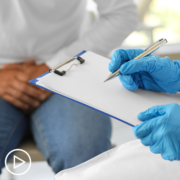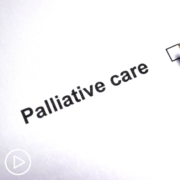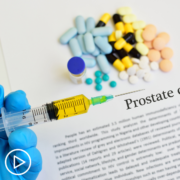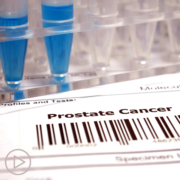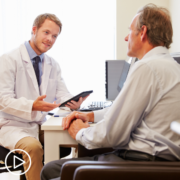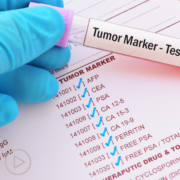An Expert Debunks Advanced Prostate Cancer Myths from Patient Empowerment Network on Vimeo.
Dr. Atish Choudhury debunks common myths about advanced prostate cancer, including concerns about genetics, treatment, and side effects.
Dr. Atish Choudhury is the Co-Director of the Prostate Cancer Center at Dana-Farber/Brigham & Women’s Cancer Center. Learn more about Dr. Choudhury here.
See More from Engage Prostate Cancer
Related Resources
Transcript:
Katherine:
I’d like to address a list of common concerns about treatment that we’ve heard from the community. So, I’d love to get your take on these. “There’s nothing that can be done about advanced prostate cancer.” Is that true?
Dr. Choudhury:
So, that is very much untrue in that even patients with pretty advanced prostate cancer – even what we call “high-volume” kinds of prostate cancer – can live for years, and years, and years with appropriate treatments.
And the concern, oftentimes, is that the way that we get those years, and years, and years are with treatments that lower levels of testosterone, and I’m guessing that some of your questions coming up are related to concerns around side effects of treatment. But many of our patients tolerate those side effects pretty well and can live quite a good, and vigorous, and fulfilling life even with pretty advanced prostate cancer.
Katherine:
The next one: “Clinical trials are a last-resort treatment option.”
Dr. Choudhury:
Yeah, so, as I’d mentioned before, clinical trials can be appropriate anywhere along the treatment trajectory of prostate cancer, and they are often being compared against standards which are often pretty good, but can we make them better? And certainly, participating in clinical trials isn’t for everyone, but for a long of our patients who are interested in seeing if an experimental approach might be beneficial to them or contributing some knowledge to patients down the line really do find trial participation to be quite fulfilling.
Katherine:
All right. The next one is: “Prostate cancer isn’t genetic, so I don’t need to be tested.” Is that the case?
Dr. Choudhury:
No. So, it turns out that prostate cancer is actually one of our most heritable cancers. Somewhere between 40% and 50% of the predisposition to prostate cancer is actually genetic, or inherited based on family. So, the part that’s tricky and the part that is hard to maybe explain to patients is that a lot of that heritability is not encompassed in particular cancer genes in the way that many people are familiar with with breast and ovarian cancers, which are often linked to genes called “BRCA-1” and “BRCA-2.” So, a small subset of patients with prostate cancer do have alterations in that BRCA-2 gene, or BRCA-1, or ATM, or some other genes involved in breast and ovarian cancers.
And that does impact, potentially, their treatments down the line, and certainly is impactful for themselves, their siblings, their children as far as, potentially, screening recommendations for other cancers. But oftentimes, we’ll do one of these tests in patients who have a pretty extensive family history of prostate cancer, and they come out negative, and the patient is very confused because they clearly have a family history, but it’s because not all the risk of prostate cancer is actually encompassed in these gene tests that we run.
Katherine:
Ah, okay. The next concern is “I’ll lose all sexual function when I receive treatment.”
Dr. Choudhury:
So, it very much depends exactly what the treatment is, and what’s being offered, and what the recovery is like.
So, for example, for patients who go into a prostatectomy and have very good erectile function, it’s not inevitable that you’ll lose your sexual functioning after a prostatectomy. There is a process – we kind of refer to it as “penile rehab” – of using medications like a Viagra or Sialis to restore the blood flow. You could use certain things like vacuum pump devices to restore the blood flow, and again, it’s not inevitable that people are going to lose their sexual functioning after a prostatectomy.
Even with testosterone suppression, while it plays a role in libido and erectile function, it’s not inevitable that people lose their libido and erectile function completely, even on these drugs. But certainly, more often than not, people will lose their erectile function on testosterone-lowering medications.
And so, there are alternative ways to get erections – involving, again, use of vacuum pump devices or injections that people can give themselves into the penis. People can have penile implant surgery to be able to get erections that way. And so, it’s really dependent on what the situation is.
Again, none of those more mechanical interventions are really ideal, but particularly when people have a defined course of treatment – for example, a surgery or radiation with a brief course of hormones – people can recover erectile function even after those sorts of interventions. And if they can’t, then we do have other approaches that will allow people to still be able to be sexually intimate with their partner after all of the treatments are completed.
Katherine:
Dr. Choudhury, one more concern: “My symptoms and side effects can’t be managed.”
Dr. Choudhury:
Yeah. So, again, it’s very rare that we run into situations where there are side effects or symptoms that can’t be managed at all, in the sense that we have very effective medications against hot flashes, or moodiness, or pain, or –just fatigue. And certainly, lifestyle plays a big role in this. Also, a lot of the symptoms that people express are related to underlying depression and anxiety issues, and certainly, engaging with a mental health provider can be helpful in terms of managing those as well.
And then, there’s a lot of nonpharmacologic treatments – meaning nonmedication approaches that can provide people a lot of benefit in terms of their quality of life, and we have an integrative center called the Zakim Center for Integrative Medicine that helps with the relaxation techniques, and massage, and yoga, and acupuncture…
And people find different approaches to help manage these symptoms and side effects. And so, it’s very unusual where we run into a situation where the side effects are unbearable and unmanageable. Usually, we can manage them in some form of way that allow people to have, again, a good quality of life and a meaningful life, even on prostate cancer treatment.





